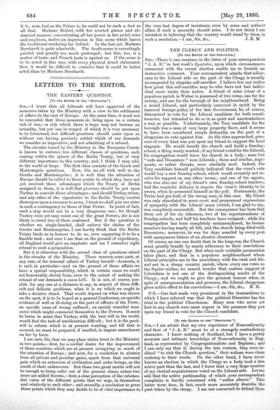THE CLERGY AND POLITICS.
[rO THE Maros OF THE SPECTATOR.] SIR,—There is one sentence in the letter of your correspondent "J. A. B." in last week's Spectator, upon which circumstances connected with the recent election enable me to furnish an instructive comment. Your correspondent admits that adher- ence to the Liberal side on the part of the Clergy is usually accompanied by singular self-sacrifice. I believe few can realise how great this self-sacrifice may be who have not had indivi- dual cases under their notice. A friend of mine (vicar of a populous parish in Wales) is possessed of two votes, one for the county, and one for the borough of his neighbourhood. Being a sound Liberal, and particularly exercised in spirit by the immoral foreign policy of the late Government, he, of course, determined to vote for the Liberal candidate for both consti- tuencies, but intended to do so in as quiet and unostentatious a way as possible. Unfortunately, the Tory candidate for the borough was a man of very large property there, and it seems to have been considered simple disloyalty on the part of a clergyman to vote against him. As the time approached, pres- sure of every kind was put upon my friend to support the local magnate. He would benefit the church and build a Sunday- school, a thing sorely wanted ; if my friend voted for the Liberal, his congregation would leave his church in a body; none but "cads and Dissenters" were Liberals ; these and similar, argu- ments, or rather threats, were similarly used. Indeed, the Tory candidate himself politely indicated that the vicar's vote would buy a new Sunday-school, which would certainly not re- ceive his support on any other terms ; and one of his agents, who was also one of my friend's own Sunday-school teachers, had the exquisite delicacy to require the vicar's identity to be sworn, when he presented himself at the poll. Fortunately, the Tories had got hold of the wrong man, in this case. My friend was only stimulated to more overt and pronounced expressions of sympathy with the Liberal cause (which, I am glad to say, was completely successful). But the consequence has been that three out of his six sidesmen, two of his superintendents of Sunday-schools, and half his teachers have resigned ; while his congregation has been completely metamorphosed, its former members having nearly all left, and the church being filled with Dissenters ; moreover, he was for days assailed by every post with anonymous letters of an abusive character.
Of course, no one can doubt that, in the long-run, the Church must greatly benefit by manly adherence to their convictions on the part of the Clergy. But when such veritable persecution takes place, and that in a populous neighbourhood where Liberal principles are in the ascendency with the rank and file, and not in a sleepy country parish, where every one votes as the Squire wishes, we cannot wonder that zealous support of Liberalism is not one a the distinguishing marks of the Clergy ; and we ought to give the greatest honour when, in spite of misrepresentation and pressure, the Liberal clergyman gives active effect to his convictions.—I am, Sir, &c., R. H.
P.S.—One fact made very prominent in the transactions to which I have referred was that the political Dissenter has his rival in the political Churchman. Many men who never set foot in any church were most urgent in the pressure they put upon my friend to vote for the Church candidate.


































 Previous page
Previous page